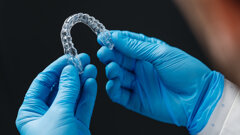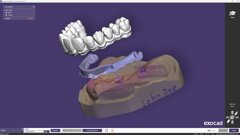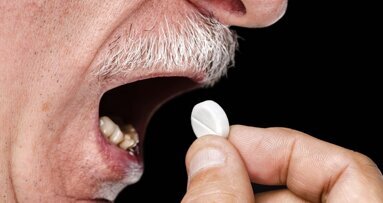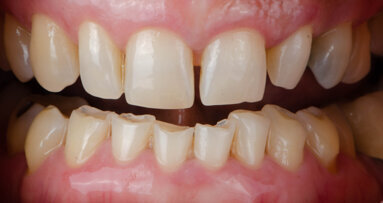SYDNEY, Australia: Dentists commonly encounter bruxism and manage its effects. However, bruxism is not always recognised as being potentially drug-induced. In a recent article, the Australian Dental Association has listed the commonly prescribed antidepressant, anti-psychotic and antiemetic medicines associated with bruxism. Drug-induced movement disorders will generally not improve unless medication is ceased or the dose reduced. Timely identification and management of drug-induced adverse effects is essential for the problem to be resolved.
According to the Sleep Health Foundation, an Australian organisation that promotes healthy sleep, about half of the community grinds their teeth, and it affects 30% of children. Clinical consequences of bruxism include jaw-muscle hypertrophy; erosion, fracture and failure of teeth, restorations and implants; sensitivity and pain in teeth, muscles and joints; and temporomandibular joint disc displacement.
The article outlines how various medications have been associated with bruxism, the most common of which being selective serotonin reuptake inhibitor (SSRI) antidepressants. SSRIs, including citalopram, escitalopram, fluoxetine, fluvoxamine, paroxetine and sertraline, are commonly prescribed for anxiety and depression and have all been reported to cause iatrogenic bruxism, most likely owing to their anti-serotonergic and anti-dopaminergic effects.
Serotonin and noradrenaline reuptake inhibitors atomoxetine, venlafaxine and duloxetine have also been associated with bruxism. A systematic review of the relationship between serotonergic antidepressants and bruxism showed that the medicines most commonly reported with this effect were fluoxetine, venlafaxine and sertraline. The average time of onset of bruxing was three to four weeks after the start of medication or on dose escalation. However, case reports suggest the effect may also occur from the very first dose.
Both typical and atypical anti-psychotic drugs can cause bruxism. Various case reports have been published also associating bruxism with the stimulant medication atomoxetine, which is used for the treatment of attention deficit hyperactivity disorder.
The article advises dentists to consult the manufacturer’s product information regarding medication side effects and to scan the whole adverse effect section to find mention of the side effects occurring in the oral cavity.
Tags:
BILBAO, Spain: While the systemic health implications of neuropsychiatric disorders are well recognised, their connection to poor oral health—in ...
MELBOURNE, Australia/STOCKHOLM, Sweden: For older adults, salivary gland hypofunction can be a common side-effect of prescribed medications. The condition ...
NEW YORK, U.S.: Heads of States will convene in New York on 27 September for the third United Nations High-level Meeting on Noncommunicable Diseases (UN HLM...
Dr Martin Wanendeya is an award-winning implant dentist with a passion for restoring function, aesthetics and confidence for his patients. Alongside ...
VADODARA, India: The flow of Eastern philosophical and spiritual systems to the US has, since the 1960s, exerted a well-known and powerful influence on the ...
CHARLESTON, S.C., U.S.: Autism affects a child’s social skills. Even simple tasks, such as scheduling an appointment at a dentist’s office, may often be...
ITABIRA, Brazil: Verbal bullying at school can negatively impact an adolescent’s mental health, causing distress and anxiety. A Brazilian study has shown ...
During the 2025 International Dental Show, Dental Tribune International sat down with Terri Capriolo, senior vice president of oral health at Carbon, to ...
In medicine, it is widely accepted that medical implants and treatments require revision over time. In orthopaedic surgery, for example, joint replacements ...
MALMÖ, Sweden: Research has shown that bruxism not only causes damage to teeth but may also result in implant failure. To further investigate the issue, ...
Live webinar
Wed. 4 March 2026
12:00 pm EST (New York)
Munther Sulieman LDS RCS (Eng) BDS (Lond) MSc PhD
Live webinar
Wed. 4 March 2026
1:00 pm EST (New York)
Live webinar
Wed. 4 March 2026
8:30 pm EST (New York)
Lancette VanGuilder BS, RDH, PHEDH, CEAS, FADHA
Live webinar
Fri. 6 March 2026
3:00 am EST (New York)
Live webinar
Mon. 9 March 2026
12:30 pm EST (New York)
Live webinar
Mon. 9 March 2026
3:00 pm EST (New York)
Live webinar
Tue. 10 March 2026
4:00 am EST (New York)
Assoc. Prof. Aaron Davis, Prof. Sarah Baker



 Austria / Österreich
Austria / Österreich
 Bosnia and Herzegovina / Босна и Херцеговина
Bosnia and Herzegovina / Босна и Херцеговина
 Bulgaria / България
Bulgaria / България
 Croatia / Hrvatska
Croatia / Hrvatska
 Czech Republic & Slovakia / Česká republika & Slovensko
Czech Republic & Slovakia / Česká republika & Slovensko
 France / France
France / France
 Germany / Deutschland
Germany / Deutschland
 Greece / ΕΛΛΑΔΑ
Greece / ΕΛΛΑΔΑ
 Hungary / Hungary
Hungary / Hungary
 Italy / Italia
Italy / Italia
 Netherlands / Nederland
Netherlands / Nederland
 Nordic / Nordic
Nordic / Nordic
 Poland / Polska
Poland / Polska
 Portugal / Portugal
Portugal / Portugal
 Romania & Moldova / România & Moldova
Romania & Moldova / România & Moldova
 Slovenia / Slovenija
Slovenia / Slovenija
 Serbia & Montenegro / Србија и Црна Гора
Serbia & Montenegro / Србија и Црна Гора
 Spain / España
Spain / España
 Switzerland / Schweiz
Switzerland / Schweiz
 Turkey / Türkiye
Turkey / Türkiye
 UK & Ireland / UK & Ireland
UK & Ireland / UK & Ireland
 Brazil / Brasil
Brazil / Brasil
 Canada / Canada
Canada / Canada
 Latin America / Latinoamérica
Latin America / Latinoamérica
 USA / USA
USA / USA
 China / 中国
China / 中国
 India / भारत गणराज्य
India / भारत गणराज्य
 Pakistan / Pākistān
Pakistan / Pākistān
 Vietnam / Việt Nam
Vietnam / Việt Nam
 ASEAN / ASEAN
ASEAN / ASEAN
 Israel / מְדִינַת יִשְׂרָאֵל
Israel / מְדִינַת יִשְׂרָאֵל
 Algeria, Morocco & Tunisia / الجزائر والمغرب وتونس
Algeria, Morocco & Tunisia / الجزائر والمغرب وتونس
 Middle East / Middle East
Middle East / Middle East











































is there a link to the article?